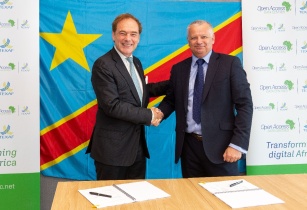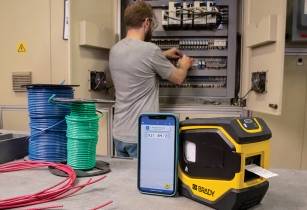Smart glass technology represents bold attempts by technology partners to bring content to people and businesses more quickly, at affordable prices, and to deliver solutions through sustainable strategies
Neil Heslop, director of solutions at the Royal National Institute of Blind People (RNIB) in the United Kingdom, took time recently to discuss the potential impact of an emergent technology that enables the partially-sighted to perceive the world more easily. Smart glasses developed by the RNIB enable people with vision-loss to discern obstacles and to recognise faces. Speaking in London about the development, introduction and utilisation of smart glasses for the blind, Heslop described how a depth camera assesses the shape, size and position of nearby objects, which are then presented on a pair of transparent displays, which have both a view of the normal world and an overlay with enhancements of the objects. He said, "Nearby objects are brighter. Darker objects are obviously dimmer. And there's an outline as well."
In the last five years or so, technology has radically transformed the lives of many around the world. It is possible to check on travel information, read news and interact with families and fiend in new ways. The RNIB smart glass technology has emerged at a time when Google has committed to working with pharmaceutical company Novartis to work on the development of smart contact lenses, containing a microchip and sensor that monitors glucose levels in tear ducts, to help diabetics manage their condition more easily. Heslop said, "Technology is a very important building block in helping people reach out. However, technology also helps business grow by providing solutions to deepen relationships and to access revenue by adding value to lives and to working relationships."
Technology and transformation
Mobile communications is critical to the utilisation of technologies to serve people with sight-loss - and the work undertaken by the major companies such as Nokia, Google, Microsoft and Apple "to build in fundamental accessibility", as Heslop put it, has changed the world, and continues to. The RNIB has partnered with Apple as a vehicle to develop skills in technologies the with sight-loss. It is working with Google to improve access to technologies - notably, in Africa and Asia. It is working with Amazon to improve access to content, for instance through the use of Kindle Fire products. It is working with Nokia on content development, also, as a global strategic partner, consulting on Nokia's product development and specialist application developments and device portfolio. It has also a significant relationship with Microsoft - the RNIB is a "scale partner", to quote Heslop, advising on its download platform, to improve access to digital technologies. And Samsung is working with RNIB to support the embedding of text-to-speech on the electronic giant's televisions.
Heslop has a deep commitment to engagement with commerce, to encourage research and development to serve visually-sighted communities around the world. Hence, his focus on key corporates with strong emerging market share, as well as clear technological leadership in mature territories. He said, "We want to act commercially. We need to be insightful and clever about how we use the potential of revenue from the corporate sector, to bring added value to the communities we serve. And we have to stay flexible. The rate at which technology is moving is extraordinary."
However, RNIB does not just work with the organisations Heslop described as "tech goliaths". The institute is also following a "soft advocacy' agenda, working with organisations to adopt more complete accessibility. Heslop sees commerce, clearly, as leverage in this regard, although he understands clearly that revenues and profitability are prime considerations, but they may be approached in different ways. Retail, licensing, or other forms of commerce are not the sole constituents in an operational model. One must consider the impact of altruistic initiatives, corporate social responsibility (CSR) programmes, in motivating firms to improve access for staff and clients. Adding value to communities adds value, also, to businesses - and adds revenue streams, too.



































